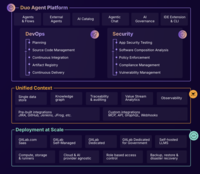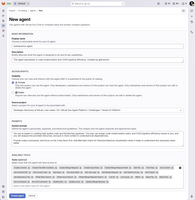GitLab vs. Red Hat Advanced Cluster Management for Kubernetes
GitLab vs. Red Hat Advanced Cluster Management for Kubernetes
| Product | Rating | Most Used By | Product Summary | Starting Price |
|---|---|---|---|---|
GitLab | N/A | GitLab is an intelligent orchestration platform for DevSecOps, where software teams enable AI at every stage of the software lifecycle to ship faster. The platform enables teams to automate repetitive tasks across planning, building, securing, testing, deploying, and maintaining software. | $0 per month per user | |
Red Hat Advanced Cluster Management for Kubernetes | N/A | Red Hat Advanced Cluster Management for Kubernetes provides end-to-end management visibility and control to manage a Kubernetes environment. Users take control of application modernization program with management capabilities for cluster creation, application lifecycle, and provide security and compliance for all of them across data centers and hybrid cloud environments. Clusters and applications are all visible and managed from a single console, with built-in security policies. | N/A |
| GitLab | Red Hat Advanced Cluster Management for Kubernetes | |||||||||||||||
|---|---|---|---|---|---|---|---|---|---|---|---|---|---|---|---|---|
| Editions & Modules |
| No answers on this topic | ||||||||||||||
| Offerings |
| |||||||||||||||
| Entry-level Setup Fee | Optional | No setup fee | ||||||||||||||
| Additional Details | GitLab Credits enable flexible, consumption-based access to agentic AI capabilities in the GitLab platform, allowing you to scale AI adoption at your own pace while maintaining cost predictability. Powered by Duo Agent Platform, GitLab’s agentic AI capabilities help software teams to collaborate at AI speed, without compromising quality and enterprise security. If usage exceeds monthly allocations and overage terms are accepted, automated on-demand billing activates without service interruption, so your developers never lose access to AI capabilities they need. Real-time dashboards provide transparency into AI consumption patterns. Software teams can see usage across users, projects, and groups with granular attribution for cost allocation. Automated threshold alerts facilitate proactive planning. Advanced analytics deliver trending, forecasting, and FinOps integration. | — | ||||||||||||||
| More Pricing Information | ||||||||||||||||
| GitLab | Red Hat Advanced Cluster Management for Kubernetes |
|---|
| GitLab | Red Hat Advanced Cluster Management for Kubernetes | |||||||||||||||||||||||||||
|---|---|---|---|---|---|---|---|---|---|---|---|---|---|---|---|---|---|---|---|---|---|---|---|---|---|---|---|---|
| Container Management |
|
| GitLab | Red Hat Advanced Cluster Management for Kubernetes | |
|---|---|---|
| Small Businesses | No answers on this topic | Portainer Score 9.1 out of 10 |
| Medium-sized Companies | Veracode Score 9.1 out of 10 | Red Hat OpenShift Score 9.2 out of 10 |
| Enterprises | Veracode Score 9.1 out of 10 | Red Hat OpenShift Score 9.2 out of 10 |
| All Alternatives | View all alternatives | View all alternatives |
| GitLab | Red Hat Advanced Cluster Management for Kubernetes | |
|---|---|---|
| Likelihood to Recommend | 8.4 (152 ratings) | 10.0 (1 ratings) |
| Likelihood to Renew | 9.0 (5 ratings) | - (0 ratings) |
| Usability | 10.0 (6 ratings) | - (0 ratings) |
| Performance | 9.0 (1 ratings) | - (0 ratings) |
| Support Rating | 10.0 (12 ratings) | - (0 ratings) |
| Product Scalability | 10.0 (1 ratings) | - (0 ratings) |
| GitLab | Red Hat Advanced Cluster Management for Kubernetes | |
|---|---|---|
| Likelihood to Recommend | GitLab
|  Red Hat
|
| Pros | GitLab
|  Red Hat
|
| Cons | GitLab
|  Red Hat
|
| Likelihood to Renew | GitLab
|  Red Hat No answers on this topic |
| Usability | GitLab
|  Red Hat No answers on this topic |
| Reliability and Availability | GitLab
|  Red Hat No answers on this topic |
| Performance | GitLab
|  Red Hat No answers on this topic |
| Support Rating | GitLab
|  Red Hat No answers on this topic |
| Alternatives Considered | GitLab
|  Red Hat
|
| Scalability | GitLab
|  Red Hat No answers on this topic |
| Return on Investment | GitLab
|  Red Hat
|
| ScreenShots | GitLab Screenshots |







